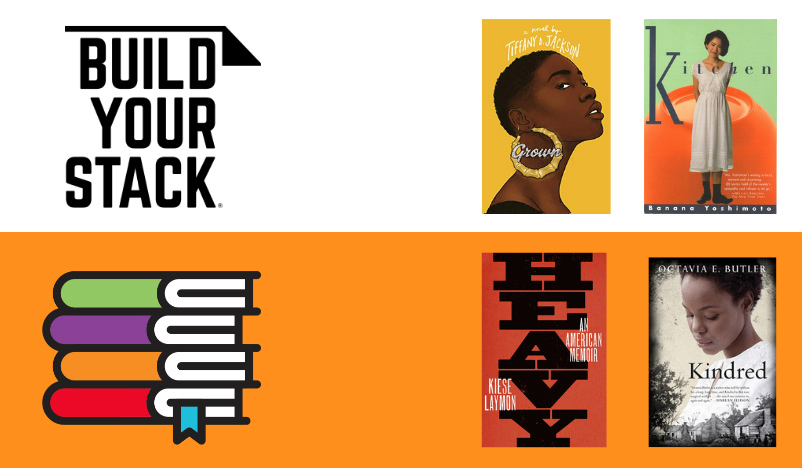This blog post was written by NCTE member KáLyn Banks Coghill. It’s part of Build Your Stack,® an NCTE initiative focused exclusively on helping teachers build their book knowledge and their classroom libraries. Build Your Stack® provides a forum for contributors to share books from their classroom experience; inclusion in a blog post does not imply endorsement or promotion of specific books by NCTE.
When I was an AP English student in Elk Grove, California, back in 2008, I was introduced to texts which helped expand my mind and prepared me for college. Reading texts like Siddartha, The Poisonwood Bible, and Their Eyes Were Watching God allowed for robust discussions in my high school class. As a student, I was challenged to think critically and engage deeply with the texts. I still recommend these books to high school students because of their impact on me and my classmates. My high school teacher Ms. Wilde let us use creative ways to discuss these texts as well. In that class, I could use poetry to express my own opinions and interpretations of the text. Creative freedom and open-ended assignments based on the readings helped to influence my pedagogical practices now as a college instructor.
I am currently a graduate teaching assistant and adjunct lecturer in the Gender, Sexuality, and Women Studies department at my university. I notice that many of my students are not exposed to feminism, Afrofuturism, or many texts written by Black or Brown people, let alone women or nonbinary folk. I am teaching a class this year called Women in Literature, and the texts that I am using would be perfect for high school students, particularly seniors or advanced placement students.
Since the summer session is an accelerated five-week course, I want to focus on only a few texts I think will be engaging. While combing through my library and getting feedback on texts my friends and family would have loved to have read in college, I realized high school students would enjoy some of these texts too.
Below is a quick list of books that would be great to teach or suggest to high school students. The first three texts are specifically from my course and the fourth is one I consider a great addition to the many books that all high school students should read and engage with. The last text is not written by a woman, but I recommend it because the narrative and prose are so powerful and relatable to all.
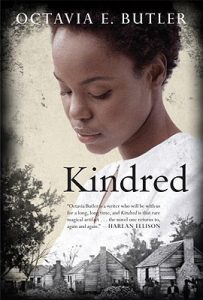 Kindred by Octavia Butler is an excellent introduction to Afrofuturism. Butler creates a world that allows her to talk about race, slavery, and time traveling in a captivating, educational way and pushes the reader to look at the world through a different lens. The powerhouse author Octavia Butler is a compelling one to start with to expose students to literature that some do not get access to until they are already in the college setting. If a student is interested in graphic novels, there is also a new edition of the text as a graphic novel. The slave narrative, as told by Butler, is presented in accessible language that makes it a very engaging and inviting read.
Kindred by Octavia Butler is an excellent introduction to Afrofuturism. Butler creates a world that allows her to talk about race, slavery, and time traveling in a captivating, educational way and pushes the reader to look at the world through a different lens. The powerhouse author Octavia Butler is a compelling one to start with to expose students to literature that some do not get access to until they are already in the college setting. If a student is interested in graphic novels, there is also a new edition of the text as a graphic novel. The slave narrative, as told by Butler, is presented in accessible language that makes it a very engaging and inviting read.
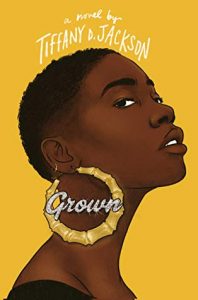 Grown by Tiffany D. Jackson is a young adult novel that talks about the adultification of Black girls, the music industry, and grooming (in the sense of building a relationship with a young person in order to exploit or abuse them.) This text is a bit mature in its approach and language, but it acts as a great introduction to adultification and grooming and the damage they inflict. It is a great audiobook as well, and an excellent choice for students who are audible learners. It could be read independently or listened to as a class, which could bring up discussions that could assist students with learning to articulate signs of abuse.
Grown by Tiffany D. Jackson is a young adult novel that talks about the adultification of Black girls, the music industry, and grooming (in the sense of building a relationship with a young person in order to exploit or abuse them.) This text is a bit mature in its approach and language, but it acts as a great introduction to adultification and grooming and the damage they inflict. It is a great audiobook as well, and an excellent choice for students who are audible learners. It could be read independently or listened to as a class, which could bring up discussions that could assist students with learning to articulate signs of abuse.
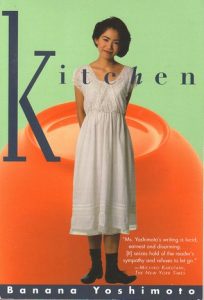 Kitchen by Banana Yoshimoto is a Japanese classic that was written in 1988 and translated in 1993. This text is a short read that talks about the main character’s engagement with food and relationships as she deals with the tragedy of the death of her caregiver. It talks about grief, queer identities, and creating nontraditional families. Kitchen is an excellent text to expose students to writers from countries other than the US, and exposes students to topics that may not find discussed in depth until they are older or in college.
Kitchen by Banana Yoshimoto is a Japanese classic that was written in 1988 and translated in 1993. This text is a short read that talks about the main character’s engagement with food and relationships as she deals with the tragedy of the death of her caregiver. It talks about grief, queer identities, and creating nontraditional families. Kitchen is an excellent text to expose students to writers from countries other than the US, and exposes students to topics that may not find discussed in depth until they are older or in college.
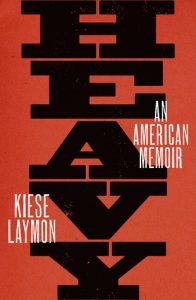 Heavy by Kiese Laymon is a newer text—a memoir that discusses racism and weight. Laymon talks about their journey to becoming a writer and a man. Heavy is a great read that will ignite discussions about coming of age and the secret trauma we all experience in this world at times. It touches on abuse and reveals how Laymon found solace in the love of a grandmother, who valued and listened to Laymon as Laymon grew into a man. These life lessons and the style of prose make this book hard to put down.
Heavy by Kiese Laymon is a newer text—a memoir that discusses racism and weight. Laymon talks about their journey to becoming a writer and a man. Heavy is a great read that will ignite discussions about coming of age and the secret trauma we all experience in this world at times. It touches on abuse and reveals how Laymon found solace in the love of a grandmother, who valued and listened to Laymon as Laymon grew into a man. These life lessons and the style of prose make this book hard to put down.
There are plenty of books that are read at the collegiate level that are perfect for high school students. Introducing these texts into the classroom helps to expand students’ minds. It also allows them to see themselves, imagine other worlds, and connect to the things they are seeing or experiencing around them. (Johnson, Koss, Martinez, 2017)
NCTE and independent bookstores will receive a small commission from purchases made using the links above.
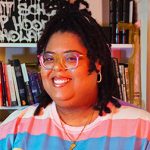 KáLyn Banks Coghill (she/her/Beyoncé) is a PhD student in the Media, Art, and Text program at Virginia Commonwealth University. She earned her bachelor’s degree in English (creative writing poetry and linguistics) from Old Dominion University and her master’s degree in Organizational Communications from Bowie State University. Her research focuses on how Black women in hip hop use their music, performances, and social media presence to digitally resist digital violence on Twitter and as a way to create harm-reduction and digital healing. You can find her latest publication “A Seat At The Table: A Repetitive Narrative of Abuse” through the International Journal of Linguistics and Communications. She coins her work as “Hoodrat Scholarship”—a self-proclaimed effort to create an ecosystem of work that can be cycled from the academy to the streets. Hoodrat Scholarship uses community outreach as a way to provide accessible information to all. Coghill uses her digital presence and works to create spaces where anyone can engage and contribute. Her favorite poem is “won’t you celebrate with me” by Lucille Clifton and she enjoys writing poetry, watching documentaries, and making her friends laugh in her spare time. Twitter: @drbiggieshorty. Website: kalyncoghill.com; hoodratscholarship.com.
KáLyn Banks Coghill (she/her/Beyoncé) is a PhD student in the Media, Art, and Text program at Virginia Commonwealth University. She earned her bachelor’s degree in English (creative writing poetry and linguistics) from Old Dominion University and her master’s degree in Organizational Communications from Bowie State University. Her research focuses on how Black women in hip hop use their music, performances, and social media presence to digitally resist digital violence on Twitter and as a way to create harm-reduction and digital healing. You can find her latest publication “A Seat At The Table: A Repetitive Narrative of Abuse” through the International Journal of Linguistics and Communications. She coins her work as “Hoodrat Scholarship”—a self-proclaimed effort to create an ecosystem of work that can be cycled from the academy to the streets. Hoodrat Scholarship uses community outreach as a way to provide accessible information to all. Coghill uses her digital presence and works to create spaces where anyone can engage and contribute. Her favorite poem is “won’t you celebrate with me” by Lucille Clifton and she enjoys writing poetry, watching documentaries, and making her friends laugh in her spare time. Twitter: @drbiggieshorty. Website: kalyncoghill.com; hoodratscholarship.com.
It is the policy of NCTE in all publications, including the Literacy & NCTE blog, to provide a forum for the open discussion of ideas concerning the content and the teaching of English and the language arts. Publicity accorded to any particular point of view does not imply endorsement by the Executive Committee, the Board of Directors, the staff, or the membership at large, except in announcements of policy, where such endorsement is clearly specified.

